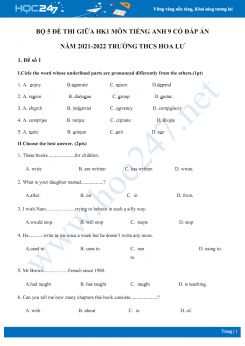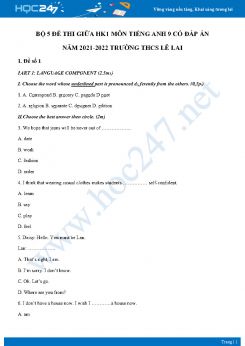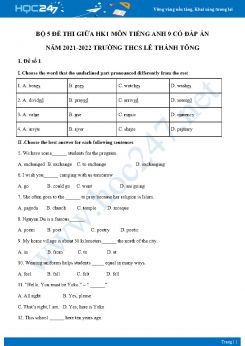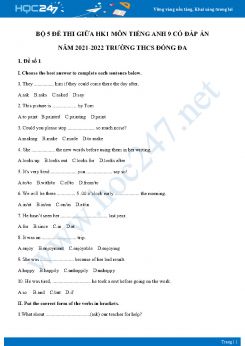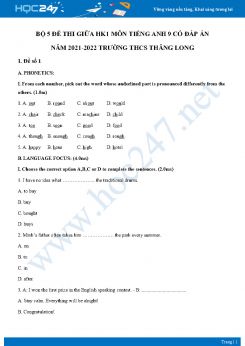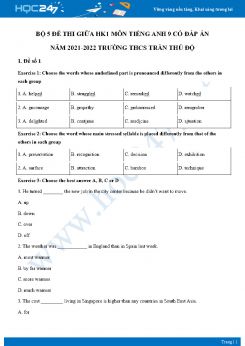Mời các em cùng tham khảo tài liệu Bộ 5 đề thi giữa HK1 môn Tiếng Anh 9 có đáp án năm 2021-2022 Trường THCS Trường Sơn do Hoc247 tổng hợp và biên soạn. Tài liệu giới thiệu đến các em các đề thi giữa học kì 1. Hi vọng tài liệu này sẽ giúp các em lớp 9 chuẩn bị thật tốt cho kì thi. Chúc các em học tập tốt!
BỘ 5 ĐỀ THI GIỮA HK1 MÔN TIẾNG ANH 9 CÓ ĐÁP ÁN
NĂM 2021-2022 TRƯỜNG THCS TRƯỜNG SƠN
1. Đề số 1
I. Put the correct form of the verbs in brackets.
1.What about ....................................(ask) our teacher for help?
2.I suggested ........................................ (help) our mother with the house work.
3.If he ............................................(be) a student, he must wear school uniform.
4.This newspaper is ........................(publish) every day. It’s a daily newspaper.
5.I don’t know who ..............................(invent) this machine?
II. Rewrite the following sentences beginning with the words given.
1. The workers will build a new school in my country next year.
-> A new school ……………………………………………
2. He is a careful driver.
-> He …………………...........................................................
3. Let’s go swimming!
-> I suggest that we ……………………………....................
4. She couldn’t join us because she was busy.
-> She was busy, so……………….........................................
5. My mother washed these clothes.
-> These clothes ………………………………….................
III. Choose the best answer to complete each sentence below.
1. They ................ him if they could come there the day after.
A.ask B.asks C.asked D.say
2. This picture is …………… by Tom
A.to paint B.painted C.painting D.paint
3. Could you please stop ...................... so much noise?
A.making B.make C.made D.to make
4. She ................... the new words before using them in her writing.
A.looks up B.looks out C.looks for D.looks after
5. It’s very kind ..................... you ..................... say so!
A.to/to B.with/to C.of/to D.from/to
6. We will be there ............... 5 .00 o’clock early .................... the morning.
A.in/at B.in/on C.on/in D.at/in
7. He hasn’t seen her ...................................... last year.
A.for B.since C.in D.at
8. It was an ............................ trip.
A.enjoy B.enjoyment C.enjoyable D.enjoying
9. She was ........................... because of her bad result.
A.happy B.happily C.unhappily D.unhappy
10. He was tired, ............................... he took a rest before going on the work.
A.so B.and C.but D.if
IV. Read the passage and decide which statements are T or F.
London is Britain’s biggest city. It is very old city and dates back to Romans. It’s a city of historic buildings and churches and it has many beautiful parks. It also has some of the best museums in the world. London is very crowded in summer. It is a popular city with foreign tourists, and has more than eight million visitors a year. The city is famous for its shopping and department stores. London has an excellent underground railway system, so it is easy for tourists to get around. In London, there are plenty of good restaurants where you can get excellent British food. The city also has lots of good Indian, Chinese, Japanese, Italian and Greek restaurants.
T – F statements.
1. None of the cities in Britain is bigger than London ….
2. Lon Don has historic buildings and churches. ….
3. Most of the best museums in the word are situated in London. ….
4. London is not busy in summer. …..
5. Foreign tourists like visiting London. ….
ĐÁP ÁN
I. Put the correct form of the verbs in brackets.
1. asking 2. helping 3. is 4. published 5. invented
II. Rewrite the following sentences beginning with the words given.
1. A new school will be built in my country next year by the workers.
2. He drives carefully.
3. I suggest that we should go swimming.
4. She was busy, so she couldn’t join us.
5. These clothes were washed by my mother.
III. Choose the best answer to complete each sentence below.
1. C 2. B 3. A 4. A 5. C
6. D 7. B 8. C 9. D 10. A
IV. Read the passage: T – F statements.
1. T 2.T 3.F 4.F 5.T
2. Đề số 2
I. Use the correct tense or form of verb in brackets.
1. You ever (use)………………………... a computer?
- Yes, I (have) ………………
When you last (use)………………………… it?
- I (use)…………………………… it last night.
2. They (be)…………………….. pen pals for two years.
II. Choose the best option to complete each sentence.
1. I don’t know how to drive a car. I wish I ….drive it.
A. could B. couldn’t
C. can D. can’t
2. Peter isn’t here. I wish he ……here.
A. is B. was
C. were D. weren’t
3. I ….. him since 1990 .
A. have known B. know
C. knew D. has known
4. Rice ….. in tropical country .
A. grow B. aren’t grown
C. grows D. is grown
5. Her …………. handkerchief looks very nice. She has spent the whole week making it.
A. embroidery
B. embroidering
C. embroiders
D. embroidered
III. Pick out the word that has the underlined part pronounced differently from the rest
1. A. climb B. limb
C. lime D. crime
2. A. garage B. storage
C. shortage D. encourage
3. A. ticked B. looked
C. booked D. naked
4. A. shelf B. knife
C. of D. leaf
5. A. dry B. carry
C. bury D. lorry
IV. Rewrite these sentences.
1 . He often played the piano at night.
He used to …………………………………..
2 . They built this house last month.
This house ……………………………………
3 . What about playing soccer?
Why don’t we …………………………………………
4. How long is it since you saw Tom?
When ………………………………………………
5 . They have worked in that factory for 10 years.
They started ……………………………….
6 . She enjoys going swimming
She is interested in ……………………………..
ĐÁP ÁN
I. Use the correct tense or form of verb in brackets.
1. Have you ever used – have – did you last use – used
2. have been
II. Choose the best option to complete each sentence.
|
1. A |
2. C |
3. A |
4. D |
5. D |
III. Pick out the word that has the underlined part pronounced differently from the rest
|
1. B |
2. A |
3. D |
4. C |
5. A |
IV. Rewrite these sentences.
1. play the piano at night
2. was built last month
3. play soccer?
4. did you last see Tom
5. working in that factory 10 years ago
6. going swimming
3. Đề số 3
I. Using the correct tense of the verbs to complete the sentences.
1. Lan (eat)..............................................................dinner when his friend called.
2. She rarely (get) ............................................. home before six o'clock.
3. We (not/ begin) ............................... to study for the test yet.
4. They (see) .................................................................. this movie before.
5. My friend is a writer. She (write) .............................................. many books.
II. Choose the best answer.
1. The ao dai is usually made of a light .................
A. cotton
B. design
C. symbol
D. material
2. They................. in Hue................. a long time.
A. were living/ for
B. were living/ since
C. have lived/ for
D. have lived/ since
3. These plants .................................. for animals' food.
A. can grow
B. can be grown
C. have grown
D. grow
4. Japanese people usually wear kimonos on special .........................
A. occasions
B. times
C. situations
D. places
5. He used to ...................................................... to school by his mother.
A. take
B. taking
C. taken
D. be taken
6. They wish they .............................. a new house now.
A. have
B. had
C. will have
D. would have
7. It rains heavily, ........................................ I can't go to the movies with you.
A. and
B. but
C. because
D. so
8. He asked me where I ................................ the next day.
A. go
B. went
C. will go
D. would go
III. Choose the word that has the underlined part pronounced different from the other .
1. A. accept B. activity
C. across D. afraid
2. A. boat B. cow
C. grocer D. grow
3. A. display B. drive
C. exciting D. idea
4. A. amusing B. cousin
C. homesick D. season
IV. Use the words given to fill in the blanks. There is one extra word that you do not need to use.
|
down – air – quickly – about – save - dirty – important – pollute – grow |
We all are destroying the Earth. The seas and rivers are too (1).......................... to swim in. There is so much smoke in the (2) ................................ that it is unhealthy to live in many of the world's cities. In one well-known city, for example, poisonous gases from car (3) ............................. the air so much that policemen have to wear oxygen masks. We have cut (4)......................... so many trees that there are now vast areas of wasteland all over the world. As a result, farmers in parts of Africa cannot (5) ......................... enough to eat. In certain countries in Asia there is so little rice. Moreover, we do not take enough care of the countryside. Wild animals are (6) ............................. disappearing. For instance, tigers are rare in India now. Because we have killed too many for them to survive. However, it is not so simple to talk (7) .............................. the problem. We must act now before it is too late to do anything about it. Join us now. (8) ..................the Earth.
V. Rewrite each sentence, beginning as shown.
1. He can't pass the examination.
→ He wishes ...........................................................................
2. She asked me "Where do you live?"
→ She asked me ........................................................................
3. Mai has lived in Hanoi since she was 10.
→ He started ...........................................................................
4. They can't speak English fluently.
→ They wish .......................................................................................
VI. Read the passage, and decide whether the statements that follow are True or False.
Everybody knows that in studying foreign languages practice is the key to fluency. All foreign language learners even the advanced learners need practice. There is a fact that a learner can know a lot of grammar rules and have a large vocabulary; however, they can't speak well yet. So the learners must know how to use what they have learnt, apart from the ability to explain grammar rules. Listening, speaking, reading and writing are all important skills but most English learners find listening and writing the most difficult.
1. The key to fluency in studying a foreign language is practice.
2. Advanced learners needn't practice.
3. Some English learners find listening and writing the most difficult skills.
4. A learner can't speak well even though he knows a lot of grammar rules and has a large vocabulary.
ĐÁP ÁN
I. Using the correct tense of the verbs to complete the sentences.
1. was eating
2. gets
3. haven't begun
4. have seen
5. has written
6. takes
II. Choose the best answer.
|
1. D |
2. C |
3. B |
4. A |
|
5. D |
6. B |
7. D |
8. D |
III. Choose the word that has the underlined part pronounced different from the other .
|
1. B |
2. B |
3. A |
4. D |
IV. Use the words given to fill in the blanks. There is one extra word that you do not need to use.
|
1. dirty |
2. air |
3. pollute |
4. down |
|
5. grow |
6. quickly |
7. about |
8. Save |
V. Rewrite each sentence, beginning as shown.
1. He wishes he could pass the examination.
2. She asked me where I lived.
3. She started living in Hanoi when she was 10.
4. They wish they could speak English fluently.
4. Đề số 4
I. Use the correct tense or forms of verb in brackets.
1. I’m busy at the moment. I (redecorate) the sitting room.
________________________________________________
2. He (be) good to me since I (be) a little girl. I (hope) I (not forget) his kindness.
________________________________________________
3. They still (live) in a small house now. But they (move) to big building as soon as they (finish) repairing it.
________________________________________________
4. All the old furniture (take) away last week.
________________________________________________
5. The lessons (write) by the students now.
________________________________________________
6. I (to surprise) by what you just (to tell) me.
________________________________________________
7. You (paint) your house at that time?
________________________________________________
8. I (send) a letter last week. I was very happy (receive) it.
________________________________________________
9. Car tires (recycle) to make sandals and floor coverings.
________________________________________________
10. There is something wrong with my printer. It needs (repair)
________________________________________________
11. I wish she (not have) to work so hard.
________________________________________________
12. We wish they (be) here now.
________________________________________________
II. Rewrite these sentences.
1. He is very lazy. He often gets bad marks. (so)
→ _____________________________________________________.
2. I began to study English 5 years ago.
→ I have ________________________________________________.
3. I don’t have a computer.
→ I wish ________________________________________________.
4. They recycle old plastic bags.
→ Old plastic bags ____________________________________________.
5. It is very cold today
→ I wish _________________________________________________.
6. They have worked in that factory since 2001
→ They started ____________________________________________.
7. She enjoys going swimming
→ She is interested in ____________________________________________.
8. What about going to the cinema tonight?
→ Shall we ________________________________________?
9. I often go to bed late.
→ I am used ____________________________________________.
10. It is interesting to go out with friends at weekends.
→ Going out ____________________________________________.
11. She went out, but she didn’t say a word.
→ She went out without ____________________________________________.
III. Choose the correct form of verbs.
1. My father (buy) a new car 2 months ago.
_____________
2. She usually (wash) her hands before meals three years ago.
_____________
3. I (be) busy last night, so I missed a good film on TV.
_____________
4. Liz (not go) to the dentist yesterday morning.
_____________
5. My mother and Hoa (cook) in the kitchen when I came yesterday.
_____________
6. The students (enjoy) reading books in the library for the last ten years.
_____________
7. She (do) homework last night.
_____________
ĐÁP ÁN
I. Use the correct tense or forms of verb in brackets.
|
1. am redecorating |
7. Were you painting |
|
2. has been – was – hope – won’t forget |
8. sent – to receive |
|
3. are still living – will move – finish |
9. were recycled |
|
4. was taken |
10. repairing |
|
5. are being written |
11. didn’t have |
|
6. was surprised – have just told |
12. were |
II. Rewrite these sentences.
1. He’s very lazy, so he often gets bad marks.
2. studied English for 5 years
3. I had a computer
4. are recycled
5. it weren’t very cold today
6. working in that factory since 2001
7. going swimming
8. go to the cinema tonight?
9. to going to bed late.
10. with friends at weekends is interesting
11. saying a word
III. Choose the correct form of verbs.
|
1. bought |
4. didn’t go |
|
2. washed |
5. were cooking |
|
3. was |
6. have enjoyed |
|
|
7. did |
5. Đề số 5
I. Choose the best answer.
1. Vietnamese people are very _________________ and hospitable.
A. reserved
B. friendly
C. official
D. quiet
2. We can learn how ______ banh chung at Tet.
A. To make
B. Made
C. Making
D. Make
3. Ho Chi Minh City has been divided into twenty-four ___________ divisions since December 2003.
A. Administrative
B. Administration
C. Administrator
D. Administer
4. Public suggest that the factories_____________ with waste treatment system.
A. Should equip
B. Would be equiped
C. Equiped
D. Would equip
5. Nam didn’t know…………….to find more information the course.
A. What
B. Where
C. why
D. while
6. The farmers in my home village ______ rice home on trucks. They used buffalo-driven carts.
A. didn’t used to transport
B. Didn’t used transport
C. didn’t use to transport
D. used to transport
7. The Imperial Citadel of Thang Long is a _______ that consists of royal palaces and monuments.
A. Structure
B. Fortress
C. Complex
D. limestone
8. At night they used to entertain ______ by telling and acting out stories.
A. Themselves
B. Them
C. Their
D. Themself
9. It ………………….that They are quieter and cheaper than taxi.
A. said
B. Are said
C. Is said
D. Say
10. The children in my home village used to go _____, even in winter. Now they all have shoes.
A. Bare-footed
B. Played around
C. Playing around
D. On foot
11. Mary asked me Where I…………………from
A. Coming
B. come
C. To come
D. came
12. I wish people in the world ______ conflicts and lived in peace.
A. Don’t have
B. Didn’t have
C. Didn’t had
D. Doesn’t have
13. In Viet Nam, ______ often refers to age and social position, not to wealth.
A. Culture
B. Seniority
C. Generation
D. Tradition
14. Tom ‘’Thanks for the nice gift’ Daisy
A. I am glad you like it
B. You are welcome
C. I myself don’t like it
D. I’m happy
15. A ______ is used to make the sound much louder so that many people can hear it from a distance.
A. Radio
B. Computer
C. Loudspeaker
D. Television
16. Traditional craft has …………………….from generation to generation
A. Passed
B. passed down
C. pass
D. Been passed down
17. My mother doesn’t work ………………….. Saturday
A. On
B. in
C. At
D. for
18. It is ……………Ha long bay was recognized as a word Heritage site by UNESCO
A. Knew
B. To know
C. known
D. knowing
II. Choose the word whose underline part is pronounced differently from the others.
19. A. measure B. conduct
C. stuck D. frustrated
20. A. impolite B. night
C. tradition D. slight
III. Choose a word in each line that has different stress pattern.
21. A. people B. enough
C. picture D. father
22. A. depend B. begin
C. agree D. happen
IV. Read the passage, and choose the best answer.
Good manners are a treasure to the people who possess them, as well as to the community they live in. Manners are taught, learnt, and passed from generation to generation.
Even hundreds of years ago, children were taught to behave responsibly. They learnt to respect seniority. When they passed an object to another person, they had to use both hands. When they entered a room, they had to bow and greet the oldest person first. Boys learnt to work hard to support their families. Girls learnt to do housework, and to take care of others. Loyalty and honesty were highly appreciated. When they made a mistake, they would not let another person be punished for it. That would be cowardly and mean. They were taught that families were b, and everybody should stick together in adversity. (tai họa, nghịch cảnh)
Fortunately, many of these values have been well preserved. They have contributed to making the unique Vietnamese culture, and strengthening our society.
23. Good manners are _______________________.
A. of great value
B. of the community
C. traditional
D. only for the old
24. What was a boy’s main duty?
A. to respect seniority
B. to support his family
C. to do housework
D. to share good things
25. The sentence: “When they made a mistake, they would not let another person be punished for it,” means they would _______________________.
A. deny their mistake
B. admit their mistake
C. keep it a secret
D. be punished
26. What contributed to making the unique Vietnamese culture?
A. tradition
B. generations
C. good manners
D. seniority
27. This passage is about_______________________.
A. people who possess good manners
B. what bad manners children in the past had
C. the preservation of bad values
D. good manners and their value
V. Read the passage and choose the best answer.
Listed as a World Heritage Site in 1999, Hoi An is the (28) …………..……. main port of Viet Nam dating back to the 16th century. Today, most of its historic (29) ………………….... have been preserved as landmarks. There are many things you can do there. For example, you can walk down the streets, (30) …………….……… by the atmosphere of times gone by. You should (31) ............... the town during the full moon, when the shop owners turn off the lights and decorate the streets with candle lanterns. You can also take a sampan ride down the Song Do River, hunting traces of foreign traders such as the Japanese, Chinese, and Dutch who made Hoi An a centre of (32) ………………..……..in old Viet Nam.
28. A. former B. form
C. older D. elder
29. A. structure B. building
C. structures D. buildings
30. A. around B. round
C. surround D. surrounded
31. A. visit B. visiting
C. to visit D. be visited
32. A. cultural B. culture
C. tradition D. traditional
VI. Write the completesentences, using the the words/ phrases given.
33. I / suggest/ that/the government/ limit/ the number / daily visitors.
__________________________________________________________________
34. She/ wish/she/ can/communicate/ her pet.
___________________________________________________________________
VII. Arrange the following words/phrases in the correct order to make a meaningful sentence.
35. didn’t/ young people/ use to/ in / computer games / the past/ play /
___________________________________________________________________
36. Viet Nam/reported/ the /Thien Duong/ it is/ longest cave/ in /that/is/
___________________________________________________________________
ĐÁP ÁN
|
1. B |
2. A |
3. A |
4. A |
|
5. B |
6. C |
7. C |
8. A |
|
9. C |
10. A |
11. D |
12. B |
|
13. B |
14. B |
15. C |
16. D |
|
17. A |
18. C |
19. A |
20. C |
|
21. B |
22. D |
23. A |
24. B |
|
25. B |
26. C |
27. D |
28. A |
|
29. C |
30. D |
31. A |
32. B |
33. I suggest that the government should limit the number of daily visitors.
34. She wishes she could communicate with her pet.
35. Young people didn’t used to play computer games in the past.
36. It is reported that Thien Duong is the longest cave in Viet Nam.
---
Trên đây là toàn bộ nội dung Bộ 5 đề thi giữa HK1 môn Tiếng Anh 9 có đáp án năm 2021-2022 Trường THCS Trường Sơn. Để xem thêm nhiều tài liệu tham khảo hữu ích khác các em chọn chức năng xem online hoặc đăng nhập vào trang hoc247.net để tải tài liệu về máy tính.
Hy vọng tài liệu này sẽ giúp các em học sinh ôn tập tốt và đạt thành tích cao trong học tập.
Các em quan tâm có thể tham khảo tư liệu cùng chuyên mục:
- Bộ 5 đề thi giữa HK1 môn Tiếng Anh 9 có đáp án năm 2021-2022 Trường THCS Hoa Lư
- Bộ 5 đề thi giữa HK1 môn Tiếng Anh 9 có đáp án năm 2021-2022 Trường THCS Lê Lai
Chúc các em học tập tốt!






